
Journal of Infrastructure Policy and Development
Scope & Guideline
Elevating interdisciplinary insights for a sustainable tomorrow.
Introduction
Aims and Scopes
- Infrastructure Policy Analysis:
The journal examines various infrastructure policies and their implications on development, providing insights into how these policies can be structured to promote sustainable growth. - Sustainability and Resilience:
A core area of focus is the sustainability of infrastructure projects, exploring how resilience can be integrated into infrastructure planning and execution to withstand socio-economic and environmental challenges. - Digital Transformation in Infrastructure:
The journal investigates the role of digital technologies in transforming infrastructure, addressing how digital tools can enhance efficiency, governance, and service delivery. - Public-Private Partnerships (PPPs):
Research on the dynamics of PPPs is prevalent, highlighting successful models, challenges faced, and strategies for effective collaboration between public and private sectors. - Regional Development and Urbanization:
The journal explores the relationship between infrastructure development and regional growth, particularly in urban settings, emphasizing the socio-economic impacts and accessibility. - Economic Impact Assessment:
It focuses on evaluating the economic implications of infrastructure projects, analyzing how investments in infrastructure can stimulate local economies and improve living standards. - Cultural and Social Dimensions:
The journal also addresses the cultural and social aspects of infrastructure development, considering how infrastructure affects community identity and social cohesion.
Trending and Emerging
- Digital Governance and Smart Infrastructure:
There is a rising interest in digital governance frameworks and smart infrastructure, emphasizing the role of technology in enhancing urban management and service delivery. - Circular Economy in Infrastructure:
Emerging discussions around circular economy principles are gaining traction, particularly in how they apply to infrastructure development and resource management. - Climate Resilience and Adaptation Strategies:
Research is increasingly focused on developing infrastructure that is resilient to climate change, exploring innovative strategies for adaptation in vulnerable regions. - Social Equity in Infrastructure Development:
A growing trend involves examining social equity in infrastructure projects, ensuring that development benefits all community segments, particularly marginalized groups. - Integration of ESG (Environmental, Social, Governance) Principles:
There is a noticeable emphasis on integrating ESG principles into infrastructure planning and management, reflecting a broader commitment to sustainability and ethical governance. - Community-Driven Development Initiatives:
Emerging themes highlight the importance of community involvement in infrastructure projects, with a focus on participatory planning and local empowerment.
Declining or Waning
- Traditional Infrastructure Models:
There appears to be a decreased emphasis on conventional infrastructure development models, as the focus shifts toward innovative and technology-driven approaches. - Environmental Impact Studies:
Although still relevant, the frequency of publications specifically dedicated to traditional environmental impact assessments is declining as integrated sustainability approaches gain traction. - Government-Centric Development Approaches:
Research focusing solely on government-led infrastructure initiatives is waning, likely due to the increasing recognition of multi-stakeholder approaches that include private and community involvement. - Static Economic Assessments:
There is a noticeable decline in static economic assessments of infrastructure projects, as dynamic and real-time analysis methods are becoming more favored. - Urban Infrastructure Planning without Community Engagement:
Themes related to urban planning that do not incorporate community engagement are less prevalent, reflecting a growing recognition of participatory approaches in infrastructure development.
Similar Journals
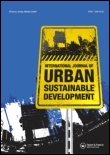
International Journal of Urban Sustainable Development
Connecting research and practice for sustainable cities.The International Journal of Urban Sustainable Development is a premier peer-reviewed journal published by Taylor & Francis Ltd, dedicated to advancing knowledge in the field of urban sustainability. With an ISSN of 1946-3138 and an E-ISSN of 1946-3146, this journal has gained recognition for its high-quality research, attaining Q1 status in multiple categories including Development, Geography, Planning and Development, and Urban Studies, per the 2023 category quartiles. Open Access since 2022, the journal ensures that groundbreaking research is widely accessible to scholars, practitioners, and policy-makers alike, enhancing its reach and impact. Operating from the United Kingdom, it focuses on a diverse array of topics related to urban environments and sustainable practices, supporting innovation and policy development. As a result, the journal holds significant placements in Scopus rankings, notably ranking #62 in Urban Studies, underscoring its pivotal role in shaping the future of sustainable urban development globally.
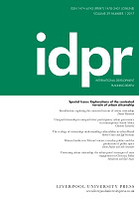
INTERNATIONAL DEVELOPMENT PLANNING REVIEW
Connecting Research with Real-World Development ChallengesINTERNATIONAL DEVELOPMENT PLANNING REVIEW, published by Liverpool University Press, is a prominent interdisciplinary journal dedicated to advancing research in the fields of development, geography, and urban planning. With its ISSN 1474-6743 and E-ISSN 1478-3401, this journal presents high-quality scholarship aimed at understanding and addressing global development issues. Recognized in the 2023 category quartiles as Q2 in both Development and Geography, Planning and Development, it ranks within the top tiers of its fields, boasting an impressive Scopus ranking: 117th out of 306 in Social Sciences _ Development and 314th out of 821 in Social Sciences _ Geography, Planning and Development. INTERNATIONAL DEVELOPMENT PLANNING REVIEW serves as a vital platform for researchers, professionals, and students, offering insightful articles that contribute to scholarly discussions and policy formations while fostering critical engagement with contemporary challenges facing urban communities globally. Its commitment to disseminating valuable knowledge positions it at the forefront of development planning literature from 2002 to 2024 and beyond.

Bitacora Urbano Territorial
Bridging Research and Practice in Urban GeographiesBitacora Urbano Territorial is an esteemed open-access journal published by Universidad Nacional de Colombia, dedicated to advancing research in the intricate fields of urban studies, geography, and the arts and humanities. Since its inception in 2009, this journal has become a vital platform for academics, practitioners, and students alike in analyzing and addressing the multifaceted dimensions of urbanization, spatial planning, and territorial development. With an evolving focus and a commitment to fostering scholarly dialogue, Bitacora Urbano Territorial proudly holds a Q2 ranking in Arts and Humanities (miscellaneous) and Q3 rankings in both Geography, Planning and Development and Urban Studies, reflecting its growing impact within the academic community. The journal welcomes contributions that explore innovative research, case studies, and theoretical advancements, providing a comprehensive reflection of urban transformations in Latin America and beyond. Emphasizing accessibility, the journal has embraced an open access model since 2016, ensuring that critical knowledge is disseminated widely to enhance understanding and promote collaboration across disciplines.
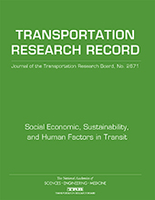
TRANSPORTATION RESEARCH RECORD
Innovating Solutions for Tomorrow's InfrastructureTRANSPORTATION RESEARCH RECORD is a premier journal published by SAGE PUBLICATIONS INC, focusing on the latest advancements and research in the fields of civil and structural engineering as well as mechanical engineering. Since its inception in 1974, this journal has become an essential platform for disseminating innovative methodologies, case studies, and comprehensive reviews that address critical issues in transportation systems and infrastructure. With a respectable Q2 ranking in both engineering categories as of 2023, it solidifies its position among reputable publications, catering to a diverse range of scholars, professionals, and students. The journal not only facilitates access to high-quality research but also plays a pivotal role in shaping policy and practice through its robust findings. For those invested in the engineering disciplines, particularly within the transportation domain, TRANSPORTATION RESEARCH RECORD is an invaluable resource, with a wide array of topics covered throughout converged years, from 1974 to 1990, and from 1993 to 2024, ensuring a comprehensive exploration of historical and contemporary challenges in transportation.
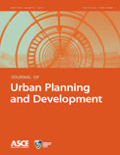
JOURNAL OF URBAN PLANNING AND DEVELOPMENT
Advancing Knowledge in Urban Design and Engineering.The JOURNAL OF URBAN PLANNING AND DEVELOPMENT, published by the ASCE-AMER SOC CIVIL ENGINEERS, stands as a pivotal platform in the realms of urban studies, civil and structural engineering, and development. With an ISSN of 0733-9488 and E-ISSN of 1943-5444, this journal aims to disseminate high-quality research addressing critical urban planning challenges, fostering innovative solutions, and contributing to sustainable development practices. Spanning from its inception in 1979 to the anticipated issues up to 2024, the journal proudly occupies the Q2 category across multiple disciplines, including Civil and Structural Engineering, Development, Geography, Planning and Development, and Urban Studies. Its noteworthy Scopus rankings reflect its influence, notably being positioned in the 76th percentile in Urban Studies. With no open access options currently available, the journal remains a selective forum for scholarly discourse, attracting researchers, professionals, and students eager to engage with cutting-edge developments in urban planning and design.
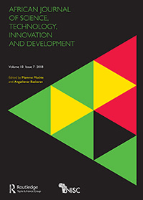
African Journal of Science Technology Innovation & Development
Exploring New Frontiers in African Science and Technology.African Journal of Science Technology Innovation & Development, published by Routledge Journals, Taylor & Francis Ltd, serves as a premier platform for disseminating cutting-edge research within the fields of science, technology, and development in the African context. Established in 2013, this journal has garnered a notable reputation, achieving a Q2 ranking in Civil and Structural Engineering and Development, as well as a Q3 ranking in both Computer Networks and Communications and Computer Science Applications for the year 2023. With its commitment to rigorous peer review and an emphasis on impactful research, the journal provides a vital avenue for scholars and practitioners alike seeking to contribute to technological and scientific advancements across the continent. Though operating under a traditional subscription model, the journal maintains accessibility for its readership, ensuring that important innovations reach a broad audience. The African Journal of Science Technology Innovation & Development is essential not only for researchers but also for policy-makers and industry stakeholders aiming to foster sustainable development through science and technology.
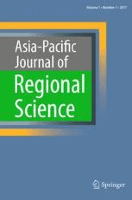
Asia-Pacific Journal of Regional Science
Innovating urban studies through global collaboration.The Asia-Pacific Journal of Regional Science, published by SpringerNature, stands out as a vital platform dedicated to advancing research in regional science, economics, and urban studies. With its ISSN 2509-7946 and E-ISSN 2509-7954, this journal has established a prominent place in the academic landscape, particularly noted for its Q2 category rankings in Development and Economics, Econometrics and Finance, as well as its engagement in Renewable Energy and Urban Studies. Operating from its base in the Netherlands, the journal's reach extends globally, fostering scholarly dialogue among researchers, professionals, and students. The 2023 Scopus rankings place it among the top quartiles in its respective categories, showcasing the relevance and impact of the research published within its pages. With a convergence period extending from 2017 to 2024, this journal aims to address critical regional issues, promote sustainable practices, and contribute to the economic discourse pertinent to the Asia-Pacific region. The open access format enhances visibility and accessibility, ensuring that groundbreaking research is available to a wider audience, thereby driving forward the fields of regional science and socioeconomic study.

Management Theory and Studies for Rural Business and Infrastructure Development
Fostering Collaboration for Dynamic Rural Economies.Management Theory and Studies for Rural Business and Infrastructure Development is an esteemed open-access journal published by Vytautas Magnus University, dedicated to advancing knowledge in the fields of rural business management and infrastructure development. With the ISSN 1822-6760 and E-ISSN 2345-0355, this journal serves as a crucial platform for researchers, professionals, and students interested in the dynamics of rural economic growth and sustainable practices. Since its establishment in 2006, it has championed the dissemination of innovative research and best practices, offering a unique opportunity to explore pressing issues affecting rural development. The journal aims to foster collaboration and pivotal discussions that can lead to impactful policies and strategies within the sector. By providing open access to all published articles, it ensures that valuable insights are readily available to a global audience, enhancing the overall impact of research in rural business and infrastructure development.
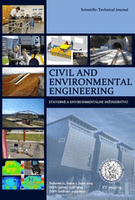
Civil and Environmental Engineering
Elevating research to shape the future of engineering.Civil and Environmental Engineering, published by SCIENDO, is a prominent open-access journal dedicated to advancing research and knowledge in the fields of civil and structural engineering, as well as environmental engineering. Since its inception in Germany, it has been committed to promoting cutting-edge studies and methodologies that address the pressing challenges in these domains. With an ISSN of 1336-5835 and E-ISSN of 2199-6512, the journal is accessible to a global audience, having adopted an open-access policy since 2014 to enhance the visibility and dissemination of scholarly work. The journal currently holds a Q3 ranking in both Civil and Structural Engineering and Environmental Engineering, as of 2023, reflecting its growing influence within the academic community. It operates within a framework of rigorous peer-review standards and encourages contributions that not only contribute to theoretical advancements but also have practical implications for real-world applications. Researchers, professionals, and students alike will find invaluable insights and innovative perspectives in the latest studies published from 2018 to 2024.
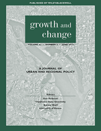
GROWTH AND CHANGE
Championing rigorous research on growth and change.GROWTH AND CHANGE is a prestigious academic journal published by Wiley, focusing on the interdisciplinary study of global and planetary change. Since its inception in 1970, this journal has served as a critical platform for researchers and scholars who seek to explore the complexities of social, economic, and environmental transformations occurring worldwide. With an impressive impact factor and renowned for its rigor, it currently holds a Q2 ranking in the Global and Planetary Change category as per the latest metrics. GROWTH AND CHANGE can be accessed through traditional subscriptions, catering to a broad audience including professionals and academic institutions. Its objectives revolve around advancing knowledge and fostering critical discussions that illuminate the challenges posed by rapid change and growth in our environments. Positioned at the forefront of debates in sustainability and development, this journal is indispensable for anyone vested in understanding and addressing the interconnected issues of our changing world.